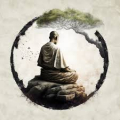Questioning your thoughts
 Jeroen
Not all those who wander are lostNetherlands Veteran
Jeroen
Not all those who wander are lostNetherlands Veteran
I was exploring the thought of Jiddu Krishnamurti through summaries generated by Google’s Gemini Chat AI, mainly because I found the titles of his books appealing but I find the style of prose awful, nearly unreadable. So through the AI-generated summaries I am getting to know Jiddu Krishnamurti’s thinking for the first time, and I find it closely corresponds to my own.
I was looking at his thinking on thought, and the first item in the summary was about self-observation, something I have found very useful in getting to know myself. This I already knew well. The second item though was about inquiry, questioning your thoughts. JK thought that our thoughts should not be accepted as absolute truth, that we should question their source and their helpfulness. He held that ultimately this would weaken their hold on us, and open us up to new perspectives.
This kind of made me wonder whether Byron Katie may not have been a follower of Jiddu Krishnamurti.



Comments
I wouldn't be surprised if Byron Katie like other Western modern day gurus had read a few spiritual books which left a lasting impression, planting a seed in the mind, germinating into a personalise Western style version of an ancient Eastern mind taming and training techniques....
In some cases when a person's life has reached rock bottom, empty, nothing to lose, example Byron Katie, Eckhart Tolle...the mind is fertile soil, some are fortunate enough to plant the right seeds ....one could say karma....
A former Estate Agent ... from Texas. Glad she is better ...
https://en.wikipedia.org/wiki/Byron_Katie
JK was, IYAM, wrong. Spending that much time on your thought, only serves as an attempt to reify the thought. This is at best an exercise in futility, because the thought isn't real in essence to begin with. As much as you might try to reify it, to make it a concrete phenomenon, it won't last more than a moment. There is nothing of value to learn.
As the instruction states: when a thought arises, let it go.
And who gives a shit about Byron Katie?
Kind and gentle,
Like the morning rain,
Like the light of the dawn…
Questioning your thoughts
Thought poses a question for itself to ponder ...
Yes, on trying it I also found that first you have to slow your thought down, and second it is thought that generates other thoughts. Questioning every thought you have is not practical.
But you can still do something like the Byron Katie approach, which is inquiring more deeply into various thought constructs that you notice that recur often or take up important amounts of time.